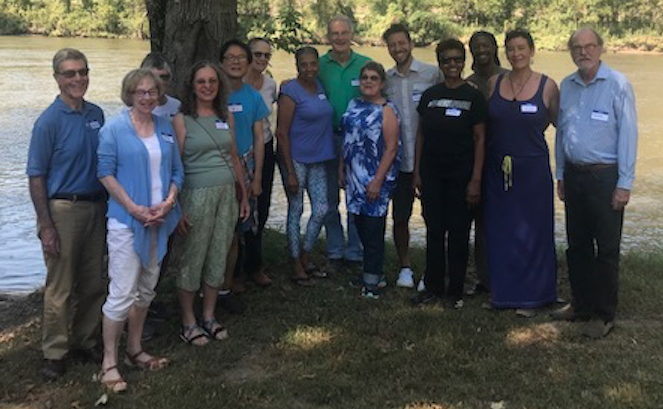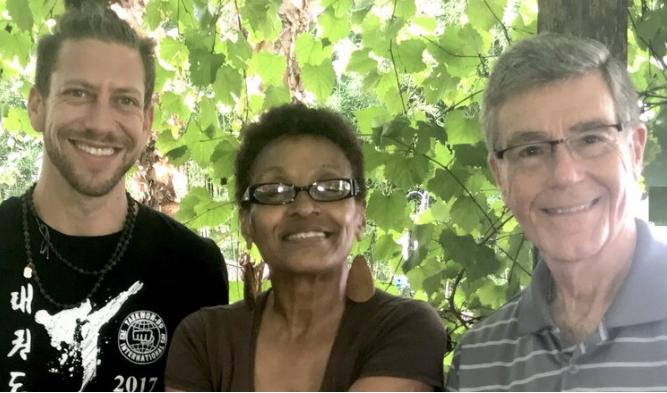BY META COMMERSE
In 2015, the BBC reported on race relations in the U.S., including survey results that three-quarters of whites don’t have nonwhite friends. America might be composed of people from everywhere, yet today, as in our early history, we live apart from the “other.”
Americans were first divided by race by the slave codes instituted in Southern colonies in the 1600s. The BBC reminds us that since that era, no federal legislation has reversed racial segregation. “Why Are Cities Still So Segregated?” an NPR program, explores this phenomenon (avl.mx/5jm).
Asheville is promoted as a beautiful vacation destination. But visitors arrive and find a conspicuous absence of people of color at our city’s desirable spaces. Our systemic separation is uninterrupted. It leaves us chronically estranged, ignorant and perhaps even fearful of each other.
A common humanity
In spring 2016, I attended a webcast conference titled Listen for a Change: Sacred Conversations for Racial Justice, hosted by Trinity Episcopal Church in Asheville, and met the people who would become the co-founders of our group. This racial healing conference offered vital information. It exposed us to the powerful work of scholars such as Kelly Brown Douglas, Bryan Stevenson, Emilie Townes and others. At the end of the conference, our host, the Rev. Dennis Fotinos, extended an invitation to anyone interested in continuing the discussion. With no idea what form this would take, two of us accepted.
So, the three of us — Dennis, Matthew Abrams and I — met monthly for 18 months and became friends. We listened intently to each other’s stories and learned, sometimes painfully, to relate across the lines of race and class. We also discussed new readings, attended other anti-racism meetings and shared this learning. At the end of that time, Matthew asked where our work was headed. That’s when it dawned on me that we had stumbled upon something useful, and I shared my dream.
I dreamed of The Race Relations Station, a place where all kinds of people gather in small groups, simply getting to know folks different from themselves and discovering their common humanity.
Hope for community wellness
I asked my fellow co-founders to reflect on their early experiences with our group. Matthew offered: “Lots of reading and analytical conversations with people of color kept my work on race and privilege purely intellectual. Once I engaged in deep relationships through sharing stories, I began engaging this work with my heart, making the work more about healing. Today, the benefits I’ve received from The Race Relations Station influence all my relationships with empathy. Now I walk this path free of the shame and defensiveness that showed up before.”
Dennis also shared his thoughts: “Participation in our triad has changed my life. The shared stories, growing trust and relationships began opening my eyes and heart to discover the ‘soul wound’ rooted in my immersion in white privilege. I have become more aware of the incredible pain and suffering that white supremacy has imposed on people of color; how heroically they have resisted, struggled and fought to maintain their courageous humanity. Thanks to Meta and Matthew, I now journey toward my own soul healing and support social justice work that challenges systemic racism.”
For my own part, I would add that this special effort was natural and organic from start to finish. These new and hard-won relationships have offered me more than hands-on learning. They brought me surprise and real hope for what community wellness can be.
Launching a pilot project
The three of us met monthly for 90-minute sessions at convenient locations. We invited others to join our discussion, and two activists, Jim Stokely and Pat Johnson, became part of our planning team. In another six months of organizing, imagining and learning, we decided to test our project in a six-month pilot. We hosted an information session in a library meeting room and had more than enough white people attend, but not enough people of color. So, I cast a net for people of color through two potluck meetings and garnered enough interest among friends to help us launch the project.
We formed four triads, each consisting of one or two white people and one or two people of color, and fostered their new relationships using our tested model. We told them that for six months, we would offer support should they run into difficulty. We provided unifying principles from the Zulu Ubuntu (“I am because we are”) and Don Miguel Ruiz’s Toltec The Four Agreements, each with indigenous or precolonial origins. We also provided a reading list for those desiring more learning.
In those six months, the planning group met consistently. We gathered participants and heard their feedback after three months, then again at the end. Surveying the participants at completion, all reports were substantive. A sampling:
“I made good connections with people different from me, who share a concern about race relations.”
“My aim in agreeing to participate was to listen and learn. My triad members helped me do this, and I hope my contributions were as helpful to them as theirs were to me.”
“I was at times offended by a sense of entitlement I saw that I wasn’t able to fully articulate to them.”
“I … was able to get further clarity about the shame I carry related to my own whiteness.”

Deeper learning
Identity questions may be the deepest anyone can raise on the journey to wholeness. Will such questions, tangled with emotion hot from generations of silence — compounded by concerns for the healing of coming generations — be triggered as we work to form relationships across race, class and gender divides? Given our history, how can they not? Will we answer these entangled, burning questions as we do this work? I suspect it is possible to find answers through the work, in the way our hearts and minds are changed by these new relationships, in the moments we share our stories, in the parts of ourselves that we make vulnerable and finally permit into the light of day. This is what healers know and historians suspect.
Without full acknowledgment, the haunting problem of systemic racism persists like psychic ghosts. Better put: Where do you live, worship and send your children to school? What do you read? Do you relax and enjoy friendship with people having identity markers different from yours? To name, acknowledge and act upon this problem is to begin the healing.
This harks back to the memory of the activist tradition I saw growing up in an ailing community on Chicago’s South Side — working from within, taking self-inventory, resisting, refusing to give up amid total sociopolitical chaos. We respectfully acknowledge that the history of racism in Asheville is unique. That it has castigated, isolated and silenced its black community. This is what systemic racism does. We invite black Ashevilleans to work with us. The Station is hardly a panacea; it is one step. We realize that we must earn the trust required to authenticate this invitation.
In our final celebration, the triads discussed their relationships — from formation to the challenges and conflict that they had resolved. One triad suggested attending cultural events together, stating that shared action is another way to help build the inner bridges between our problem and our healing. To grow the project, they suggested we advertise to attract black, young and LGBT participants.
Our work to bring this effort to the community showed us change that begins within. Now we are retooling and reimagining growth that establishes a new norm of equal relationships across artificial lines.
To contact us, visit The Race Relations Station on Facebook, or email us at racerelationstation@gmail.com.
Meta Commerse is an elder independent scholar and transplanted Ashevillean. Her Indigenous Story Medicine draws upon the healing power of story.




Before you comment
The comments section is here to provide a platform for civil dialogue on the issues we face together as a local community. Xpress is committed to offering this platform for all voices, but when the tone of the discussion gets nasty or strays off topic, we believe many people choose not to participate. Xpress editors are determined to moderate comments to ensure a constructive interchange is maintained. All comments judged not to be in keeping with the spirit of civil discourse will be removed and repeat violators will be banned. See here for our terms of service. Thank you for being part of this effort to promote respectful discussion.